Did you know that you can eat what you crave?
Well, if you’re one of our cows you can…
Cows instinctually eat things that they need. They will select weeds and grasses according to taste, just as they will lick at a salt block, because their bodies are telling them that they need whatever is in that plant or mineral. Nutritional needs of all creatures go beyond feeling just hungry or thirsty. If you are sensitive to your body’s instincts, you will know what you need without ever having taken a nutrition course or cracking a biology book. Cows in a natural, pasture-based setting will eat what is good for them in just the right amounts if it is available. This is why we’ve started a “cafeteria mineral program,” or what we like to call the Bovine Buffet.
Deficiencies in an animal’s diet (or a human’s!) occur for many reasons, the main one in America being poor farming practices over the last 200 years. Farming has gone from bio-dynamic, rotational, composting type methods to single crops, frequent tilling, and using artificial chemicals to force plants out of the ground. The result is that soil, bacteria, bugs, and organic matter are destroyed, and the plants that do grow have very little nutrition compared with their naturally-managed ancestors. Very little plant matter is added back to the soil, so after a few cycles of this kind of management, most of the nutrients originally in the soil have left the farm. Many folks try to remedy this by doing extensive soil testing and adding costly “amendments” to correct issues in the soil. We’ve decided to let the cows do all that for us.
We have implemented a mineral feeder that offers 16 individual compounds of the common minerals that cows need. This highly contrasts with conventional practices that only offer salt, or perhaps an all-in-one mineral mix that is very much like a multivitamin for humans, thus, not terribly effective when it comes to specific deficiencies.
You may ask, why do we go to all this trouble when all we’re going to do is eat the animal, anyway? Well, we suspect that many of the diseases in humans today are caused from malnutrition because so few nutrients are left in the food chain. This is our way of trying to add nutrients back in natural form so that whoever eats our cows can have access to those nutrients. The cows not only store the minerals in their fat, muscle, and bone, but they poop many of them back out in a form that is easily assimilated back into the soil. We anticipate that, over time, our pastures will become more lush and nutritious, our cattle will reproduce more efficiently, and our own health will improve because of the influx of nutrients in our food. You are what you eat, right?
Here are some of the minerals we offer the cows and some of the things that they do.
Phosphorus: Together with Calcium, makes up 90% of the minerals in the bones and 50% of the minerals in the milk of an animal. It also is part of many basic proteins, regulates enzyme activity, and maintains fluid balance between cells.
Calcium: Essential for bone and tooth development. Also regulates nutrient absorption and blood clotting. Adequate Vitamin D is required to utilize both Calcium and Phosphorus.
Magnesium: Aids in Calcium and Phosphorus utilization as well as muscle function.
Sodium: Helps maintain proper fluid pressure between cells. Helps to balance acidity of the body, to control muscle tension in the heart, and to produce bile as a digestive aid.
Iodine: Extremely important for thyroid function, which is responsible for growth and reproductive health.
Potassium: Linked to calcium and phosphorus in the bone-building process. Also aids rumen (cow’s stomach) efficiency by assisting bacterial growth and proper fluid pressure between cells.
Sulfur: Essential part of most proteins. Necessary for proper hair, hoof, and horn development.
Vitamin A: Essential for healthy skin and eyes and digestive, respiratory, and reproductive tracts.
Vitamin E: Necessary for absorbing and storing Vitamin A. Aids in enzyme and hormonal processes.
Vitamin D: Essential for proper bone growth and reproduction.
Trace Elements: Copper, Iron, Cobalt, Zinc, Manganese, and Selenium. These minerals are necessary in tiny amounts, but deficiencies in them can be detrimental to long-term health. Iron and copper are used to form hemoglobin and prevent anemia. Cobalt is necessary to synthesize Vitamin B12. Zinc aids with growth and digestive efficiency. Manganese affects the metabolism of calcium and carbohydrates.
In addition to individual minerals, we offer the cows sea salt, white salt (in case they just need good ol’ sodium chloride!), clay, and a buffer mix which contains sodium, magnesium, potassium, calcium, and sodium bicarbonate.
This has all been another part of our big “experiment”, and so far the cows are loving it! Check out these pictures!
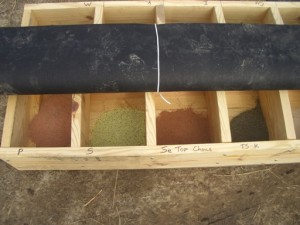 What a colorful combo! What a colorful combo! |
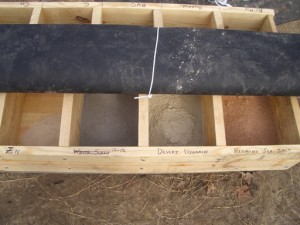 Some of the basics… Some of the basics… |
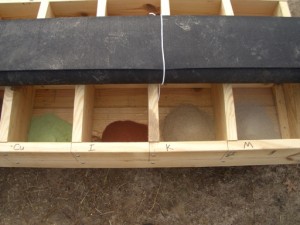 Mmmm, minerals! Mmmm, minerals! |
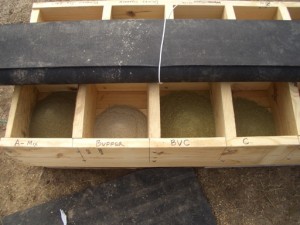 The “favorite” section. The “favorite” section. |
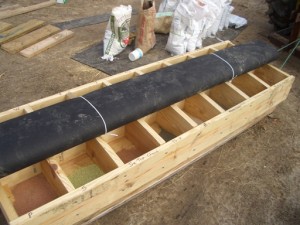 Filling Station Filling Station |
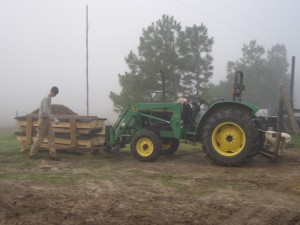 Loading up the feeders. Loading up the feeders. |
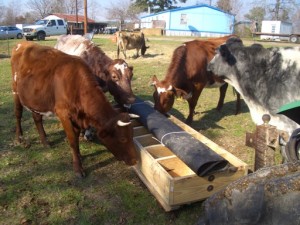 Cow taste-test. Cow taste-test. |
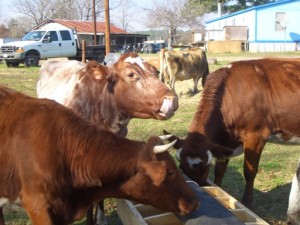 Success! Success! |

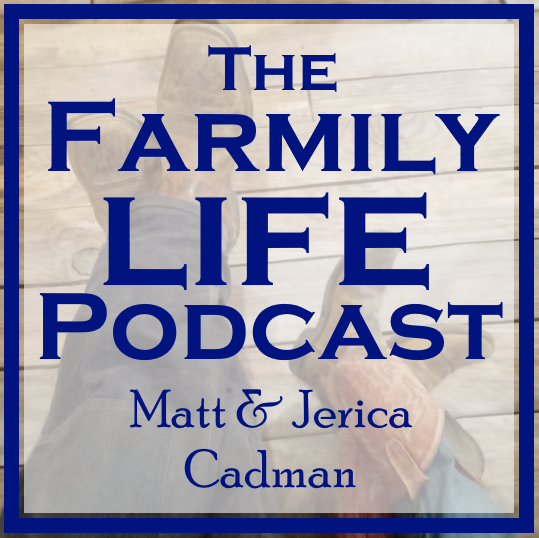

Very interesting information — thanks for taking the time to explain all of this. You are our trusted farmers, and we truly appreciate the work you do!
Thanks for reading! We always get excited about healthy animals!